Steve Addison's Blog, page 7
October 28, 2024
The Missional Fog

When you make social transformation and evangelism equal partners in the mission of God, history shows, eventually evangelism is lost.
The dominant view of contemporary missiology, is the goal of mission is to transform communities and promote human flourishing by healing social ills and bringing justice. I call it the missional fog.
Instead, in the New Testament:
Missionaries establish contact with non-Christians.
They proclaim the news of Jesus the Messiah and Savior (proclamation, preaching, teaching, instruction),
They lead people to faith in Jesus Christ (conversion, baptism), and
They integrate the new believers into the local community of the followers of Jesus (Lord’s Supper, transformation of social and moral behavior, charity).
Jesus founded a missionary church: its existence and activities were an expression of its missionary calling, its members were fearlessly determined to win others to faith in Jesus as the crucified and risen Messiah. Their mission field began at home in Jerusalem and Judea, and it extended to the ends of the earth.
The goal and purpose of their missionary work was the making of disciples and the creation of communities of disciples—people who turned from their old way of life, put their trust in Jesus, and obeyed his teaching. From Jerusalem to every people, every place.
October 27, 2024
The Lausanne Movement Has a History

John Stott, Billy Graham, Lausanne ‘74
It is our duty to be involved in socio-political action; that is, both in social action (caring for society’s casualties) and in political action (concerned for the structures of society itself).
In 1974 John Stott led the Lausanne movement to embrace both evangelism and social action as two sides of the same coin representing the mission of God. John Stott saw evangelism and social action as “two blades of a pair of scissors or two wings of a bird”. A view that Billy Graham did not support.
Lausanne has a long history that stretches back to a student missionary movement that emerged on the campuses of the United States and the United Kingdom in the late 1800s. This movement committed itself to the “Evangelization of the World in this Generation.” Tens of thousands of students took up the challenge and took the gospel to the ends of the earth. They helped shift Christianity from a predominantly European-American movement to a global movement.
This student movement ultimately led to the first World Missionary Conference held in Edinburgh 1910. The conference was driven by the watchword of “the Evangelization of the World in this Generation”.
The student missionary movement provided key leadership for Edinburgh which ultimately led to the founding of the World Council of Churches (WCC) in 1948. Yet by then, the Evangelization of the World in this Generation was no longer their watchword. Evangelism was acknowledged, but the real action lay with the social and political agenda. Eventually, the motto became, “The world sets the agenda for the church.”
Ironically, Lausanne 74 was initiated by Billy Graham as an evangelical response to the WCC’s embrace of political and social movements. Such movements were regarded as expressions of the kingdom of God. Yet the Lausanne Covenant, largely crafted by John Stott, includes the statement championed by the WCC that ‘evangelization requires the whole church to take the whole gospel to the whole world’. The “gospel” had expanded to include social, political, cultural and economic transformation.
How does that vision compare with Jesus’ example and teaching on the movement of God?
When Jesus rose from the dead he confronted a defeated band of disciples. In just forty days he transformed them into a missionary movement. How did he do it? He took them on a journey through the whole Old Testament laying a foundation for the movement of God.
He said to them, “This is what I told you while I was still with you: Everything must be fulfilled that is written about me in the Law of Moses, the Prophets and the Psalms.”
Then he opened their minds so they could understand the Scriptures. He told them, “This is what is written: The Messiah will suffer and rise from the dead on the third day, and repentance for the forgiveness of sins will be preached in his name to all nations, beginning at Jerusalem. You are witnesses of these things. I am going to send you what my Father has promised, but stay in the city until you have been clothed with power from on high.”
Luke 24:44–49
The kingdom doesn’t come without the King and good news of his death and resurrection and the call throughout the world to repent and receive forgiveness of sins.
When the promised Spirit comes in power and the Word goes out Luke shows us what the mission of God looks like in every age and in every place and among every people group. It’s all there in Acts 2 — disciples and churches to the glory of God, beginning in Jerusalem and spreading to every people and every place.
What about political and social transformation? Everywhere the gospel goes in Acts towns and cities are transformed — into riots. When the dust settles disciples and churches emerge. Was Jerusalem transformed? Jesus handed Jerusalem over to the judgment of God. Was the empire transformed? Paul stood before Nero in chains with nothing but the call to repent and have your sins forgiven.
I don’t know if the Lausanne movement is on the same trajectory as the WCC. Movements rise and fall, but not inevitably. The key to renewal is to return to the life and ministry of Jesus—his obedience to the Father’s Word, his dependence on the Holy Spirit and his faithfulness to the core missionary task.
Previously. . . Lausanne and the Evangelization of the World
October 22, 2024
Lausanne and the Evangelization of the World
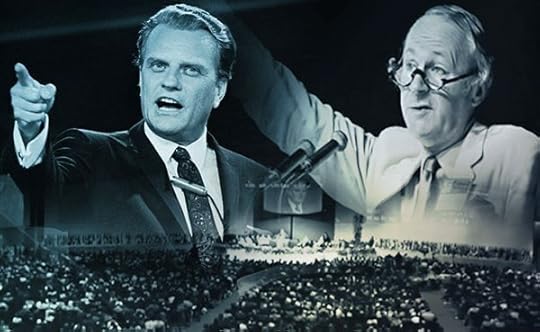
Billy Graham, John Stott
Recently thousands of Christians from 200 nations gathered in Seoul, Korea for the fourth Lausanne Congress. The first Congress in 1974 was initiated by Billy Graham and led by John Stott.
Lausanne’s founding purpose was to promote “world evangelization.” But fifty years later, Ed Stetzer asks if the Lausanne movement is losing its focus on evangelism. Stetzer reminds us, that Lausanne has always had a tension between “prioritism” (priority of evangelism) and “integralism” (evangelism as one part of holistic mission).
In 1966 Stott held that “the commission of the Church ... is not to reform society, but to preach the Gospel.” But the 1960s were a time of great social ferment and within just a few years Stott concluded that social action was an integral part of the Great Commission, that it includes a mandate to reform society by political means.
Stott drew on John’s account of Jesus telling his disciples that as his Father had sent him, so he was sending them. Just as Jesus’ mission had involved caring for people’s bodies, as well as their souls, so should that of the church.
Stott wrote, “It is our duty to be involved in socio-political action; that is, both in social action (caring for society’s casualties) and in political action (concerned for the structures of society itself).”
Billy Graham wanted Lausanne to stick to evangelism and mission as traditionally understood. But Stott threatened to resign from the committee if Graham’s vision for the movement prevailed. Stott won the day.
Lausanne embraced the view that evangelism and social action are “two blades of a pair of scissors or two wings of a bird”.
In 1974, John Stott led a revolution in our understanding of the Great Commission. Is it any wonder then, that 50 years later, the evangelization of the world is only one of many agendas pursued by the Lausanne movement?

October 21, 2024
Take off that Cross and follow me

I grew up attending an elite private school in Melbourne. It was a boy’s school, but fortunately, just down the road was the Methodist Ladies College (MLC). I have fond memories of attending dancing classes with the MLC girls in year ten.
So I was interested to hear this week that MLC has banned its students from wearing crosses for fear of offending. Someone complained so it’s off with your crosses girls. You can wear them at home.
The Methodist movement began almost three centuries ago after John Wesley’s heart was “strangely warmed” by the gospel. He wrote in his journal, “I felt I did trust in Christ alone for salvation; and an assurance was given me that He had taken away my sins, even mine, and saved me from the law of sin and death.”
Transformed, Wesley traveled throughout Britain with a vision for the conversion and discipling of a nation and the renewal of a fallen church. Within a generation that vision extended to the whole world as Methodists fanned out to faraway places like Australia sharing the gospel, planting churches and founding institutions like the Methodist Ladies College, which today has banned the wearing of crosses.
Wesley predicted something like this would happen when he wrote,
“I am not afraid that the people called Methodists should ever cease to exist either in Europe or America. But I am afraid lest they should only exist as a dead sect, having the form of religion without power. And this undoubtedly will be the case unless they hold fast both the doctrine, spirit, and discipline with which they first set out.”
In the Rise and Fall of Movements, I describe how movements rise and fall as they move towards, or away from, the life and ministry of Jesus. Who was obedient to his Father’s Word, dependent on the Holy Spirit and faithful to the core missionary task.
So I’m no longer surprised when church leaders are embarrassed by Jesus’ teaching on sex and marriage. After all, “It’s a ‘complex’ issue that may take years to work out.” I’m not surprised when mission experts turn mission into “human flourishing” and “social transformation”.
This drift has been a recurring pattern in the West for over 100 years. I don’t despair because the rest of the world is leading the way in fulfilling Jesus’ command to make disciples among every people, and in every place.
I just keep following the stories of multiplying disciples and churches to the glory of God. Everything else will pass away.
October 17, 2024
Hey Man, Nice Shirt!

Max and Sydnie
Troy Cooper was at the skate park with his kids when he spotted a 19-year-old hippie pro-skater wearing a t-shirt with Scripture on it.
He calls out, “Hey man, nice shirt!”
Max thought Troy was making fun of him so he sat down and began sharing the gospel with Troy.
Max had been praying and fasting for God to lead me to a community where I could learn how to plant churches." Troy was the answer to that prayer.
Max explained, “I’ve been a believer for just under a year. I’ve led eleven people to faith. I want to know what to do with those people.”
Troy responded, “Let’s walk together.”
Troy remembers, “By that time in Southern California, there was a church meeting almost every night somewhere. We would visit a different church each night in the home. Max was seeing the three-thirds format. He's seeing new believers participating in leadership roles within the three-thirds. He's seeing them get together outside of the gathering to share the gospel, to get in the word together, to disciple.”
“He's watching all this play out. He's learning in community. And then I think the next week, we went down with him to Oceanside and he led some guys to Christ. And my sons, Malachi and Isaiah were like, "Hey, man, you got to follow them. You got to walk with them. So they trained him.”
“After a month or two of that, he felt compelled by the Lord to go back to Phoenix. And he led his twin sister to faith.”
“He gathered some of those people that he had shared with before. And based on what he had learned from Zeal and other churches in LA, he started with the 411, the Commands of Christ, then the Church Circle tool to discover what church is from Acts 2.”
Then he started a church in his home. That one church has become many in Phoenix and throughout the US as Max traveled to skating events, connecting with his network of relationships. Everywhere he goes he leaves behind disciples and bands he’s led to Christ and trained.
Max is now married to Sydnie and they’re a team. They’ve just moved to Europe and are building a team to reach their city.
Troy has stayed close to Max and seen him grow in calling, character and competency. Max thrives on the front line, but he’s no longer alone wondering what to do. He’s now part of a community of practitioners in the US, Europe and worldwide.
Troy explains, “With Max and Sydnie serving stateside we saw their:
Calling from the Lord
Character developed (in tough times)
Competency (pioneering, training and networking)
Community in the work (disciples, peers and mentors).
That’s how we knew they were ready to be mobilized from a movement to labor among new peoples in a new place.”
This is such a good story I’m going to follow up with an interview of Max and Sydnie. Notice how God works! He brings Max and Troy together at just the right time. This is a connection made in heaven. That’s what God does, on his timetable, not ours.
But Troy and Max played their part in God’s plan. Max is a new disciple, making disciples, praying the fasting for God to send someone who to mentor and train him. Troy is out in the community with his family, sharing and making disciples. When Max comes along he immediately knows how to equip him and draw him into a community of practitioners. His sons Malachi and Isaiah know how to equip Max because they’ve been doing this their whole lives.
This is not recruitment this is a movement. This gives those who are called to missions an opportunity to grow in character, competency and community before they are mobilized.
Interview: 337 Movement to Mobilization
October 14, 2024
337-Movement to Mobilization
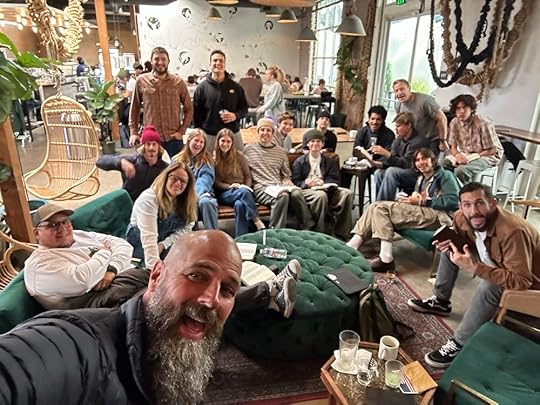
A conversation with Troy Cooper about the difference between “recruitment” and “movement to mobilization”.
October 9, 2024
Thoughts on Turned Around Leaders Turn Around Churches
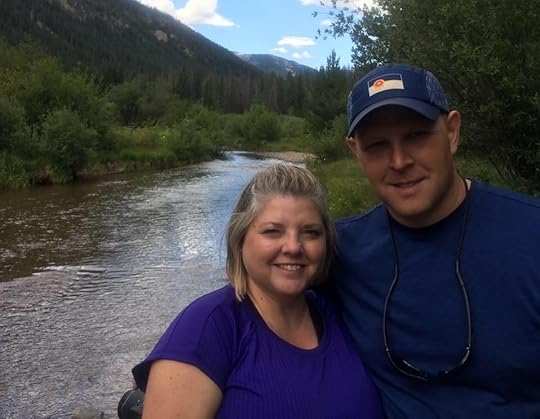
Michal and Bryan King
In 2015 when Bryan King set up a NoPlaceLeft residency it was an experiment. Looking back nine years later, the experiment was a success, but success came at a price.
The residency runs over one or two years. Residents give seven to ten hours a week and are immersed in multiplying disciples and churches — practices, principles and problem-solving.
The first residency resulted in three families deployed in South Asia. Most graduates have deployed overseas, and some have remained in local work.
But Bryan wasn’t prepared for the impact of losing so many dear friends. As each one left it felt like he was losing family.
Around the same time, his family moved into a time of real suffering and hardship with one of his children.
There were conversations he had with the Lord in which he said, “I finally know what I want to do. This is stuff my whole adult life that's been moving towards, and now I can't do those things.”
He entered a time of deep discouragement.
His validation as a disciple maker and a leader was based on results. When others criticized his movements approach he thought, “I’ll show you. I’ll do this.”
Then something began to shift in him. He sought answers to his discouragement by studying the Gospels and Acts with others. Slowly he realized, “Fruit comes and goes but this is who I am.” Bryan was becoming a different person.
Along the way, God encouraged Bryan. There was Daniel and Laura in a nearby apartment complex who came to Christ. Daniel told him, “If you guys ever think twice about if you made a difference in anyone's life, if you ever think twice about sharing the gospel with anyone, just know that you made a difference in my life.”
There was Elizabeth, “the little short Hispanic lady who showed up at that training” and learned how to share the gospel in the local convenience store, and with her friends and family. She’s joined the team and knows what to do when someone new wants to follow Christ.
Bryan realized, “If I died today, there'd be many things in my ministry that would die. But the men and women that God has raised up, that's the fruit and it's amazing.”
In the middle of pain and chaos, that’s what God was up to. “It's about men and women being transformed into the image of God and obeying Jesus no matter what because He's worthy of our worship.”
Disciples under persecution learn to keep a low profile and watch for what God does next. The breakthrough will come. The same principle applies here. While Bryan was enduring faithfully, God was preparing him for a breakthrough.
He teamed up with Jared and Josh Howard to help prevailing model churches to go after movements. They take church leaders through a six-month process of discovery in the Scriptures. They meet every two weeks online. The Word does the work as they look at Genesis to Revelation or the 4-Fields in the Gospels and Acts. As these leaders see it in the Scriptures they’re hungry for action and ready to be trained in simple tools. As these pastors are transformed, they’re ready to lead their churches into the harvest.
A new door of opportunity has opened. God has done this. When Bryan was down for the count, crying out to God, God was reshaping his heart.
Bryan says, “This is what shifted in me, I know who I am. I am a disciple. I am a disciple maker. This is my identity.”
The interview: 336-Turned Around Leaders, Turnaround Churches
Bryan’s podcast: Unleash the Priest
October 7, 2024
Terry’s Story

Terry Solley was fourteen years old when his father put a pistol in his hand and they began doing armed robberies together in Southern Louisiana.
Eventually, they were arrested and at eighteen Terry went to prison for multiple armed robberies for the next eleven years. He got out at twenty-nine and stayed out for just fifteen months. Then he and his father were arrested robbing a Wells Fargo bank and they both went back to prison this time in Texas.
Terry spent another seventeen years in prison, for a total of twenty-eight years of his life.
He became a prison gang member in his first time in prison, he rose in seniority in the gang and spent eight and half years in solitary confinement for being a threat to the order and security of the prison. He was alone, locked in his cell, twenty-three hours a day.
Between the ages of eight and fourteen, Terry went to church with his mom and stepfather, but that ended around the time he began robbing banks with his father. He knew the gospel. He would even have said, “Jesus is my Savior.”
But in jail a second time, in solitary confinement, awaiting trial with his father God got his attention. People came into the unit and shared the gospel with him. Terry realized he didn’t just need a Savior, he needed a Lord. He surrendered his life to Christ, Savior and Lord.
You don’t get free from solitary just because you become a Christian. There’s a process. It would be another two and a half years before he was released from solitary.
Freed from solitary, Terry enrolled in the prison’s seminary. Prisoners with long sentences could go to the seminary, receive a bachelor's degree in Biblical studies and be sent out as a missionary to another prison.
That’s how Terry met Don Waybright. Don was going into the prison to train the seminary students in sharing the gospel, making disciples and forming discipleship clusters that functioned as churches. (Regulations prohibit calling them churches.) Terry dived right in. Soon there were Bible studies in every day room in the prison.
Terry and the team Don trained weren’t just doing the work, they were training the disciples to share their stories and the gospel story and form groups for discipleship. As the movement grew it expanded into other Texas prisons.
Terry became a pastor to prisoners on death row. He was with the men up to their execution.
One prisoner named Anibal knew Terry from twenty years before when they were both gang members but from opposing gangs. He has been on death row for twenty-three years because he murdered a prisoner.
He was stunned by what God had done in Terry’s life. The other prisoners respected Anibal and listened to him. As he surrendered his life to Christ, he became a “man of peace” (Luke 10) through whom the gospel spread. Death row is made up of sections where fourteen men live together. Now churches are meeting in six sections of death row. They study the Scriptures and worship every day. Men like Anibal have surrendered to the Lord and are making disciples. Death row is being transformed by Christ in them, the hope of glory.
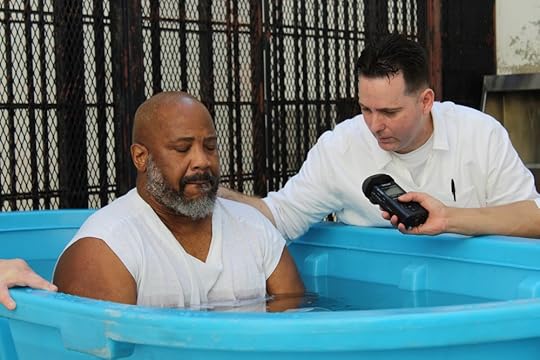
Terry Solley (right)
Terry explains, “Throughout the prison, church looks like a group of four or five men sitting around the table, studying the word of God, worshiping together, taking communion together, holding each other accountable, modeling what Christianity looks like for each other.”
“The churches are effective because the men are doing it themselves. They are sharpening each other, discipling and mentoring each other. It’s spreading from prison to prison across the Texas prison system. There are 104 prisons in Texas. We have disciples in 42 of those prisons.”
Terry says, “We know that if a man comes to Christ, his whole relational world is affected. You know, prison gives you a concept of what it means to be a man, but the Bible, the word of God, gives you a whole different concept. So I began living my life as a man of God inside of prison.”
“When I went to that seminary program at Darrington Unit, my father was there. And he began watching me. He began seeing a different son than the one he raised. He gave his life to the Lord because he saw the change that the Lord had done in me. He was 63 years old. A couple of months later, he died of stage four lung cancer.”
“We have men who surrender their life to the Lord in prison, and their children see the difference, and their wives see the difference. They come to the Lord, and they join the Christian community on the outside.”
“But a lot of men do come out of prison and they fall because they don't have accountability and support. That’s why we’re building a five-acre community called Restoration Harbor where men, long-term offenders, can come out of prison, can have a place to stay for a year to get intense discipleship training.”
“We want to build these men up to go back into the prisons with the gospel, to go to the streets with the gospel, to become generational changers through the gospel of Jesus Christ.”
“I broke my wife's heart, I left her alone with our five-month-old daughter and knowing that there are other men in prison who if they don't change, if the gospel doesn't penetrate their hearts, they'll get out of prison, make all these promises to their family and then commit crimes and go right back to prison and leave another wife heartbroken, leave another child alone to be raised without a father.”
“So when I look back on my life and I see how the Lord has changed me, how he has reconciled my family, how he has built and strengthened my relationship with my daughter, every time I wake up and look at her, it motivates me to do what I do because I don't want another wife heartbroken. I don't want another child to have to be raised without their father.”
Links
Interview: 324-Release to the Captives
September 24, 2024
336-Turned Around Leaders, Turnaround Churches
Bryan King has been on a seven-year journey learning how God turns churches around to embrace the Great Commission. Meanwhile, God had a plan to turn Bryan around.
Links:
September 22, 2024
First Five vs Second Five—What Changed?
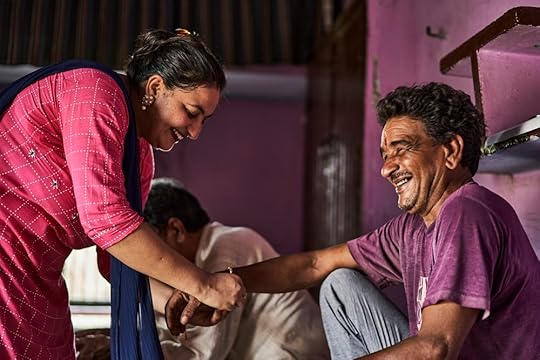
Jared spent his first eighteen months in South Asia working hard at all the right things but seeing very little fruit. Then, alone on a 14-hour car drive, he brought his complaint to God. “What is this happening!” God’s response was, “Who are you serving? Yourself or me?” Jared surrendered and the first breakthroughs were just a couple of weeks away.
They came in the form of people, local workers he trained who were committed to action.
Jared says, looking back, in your first two or three years on the field you’re looking for the people God wants you to invest in. It takes time to find those people, but they become the key to a multiplying movement, Lord willing.
You might be sharing the gospel 30 times a month, but you want to move that to 60. How do you do it? You can squeeze out some more time in your schedule and work harder, but that’s addition and it has its limits. A better and more Biblical strategy is to train others and set them loose. Now we’re talking about leadership development.
In 2020 we shared the gospel with around 40,000 people. By 2021 it was 150,000 people. That was achieved because leaders stepped up and trained ordinary people.
A leader would show up at house church and equip in three things:
1. Identity
They’d cast vision for reaching lost people and then talk about our identity in Christ as a royal priesthood, as ambassadors.
2. Oikos map
They would take out a piece of paper and have people draw their “oikos” map asking, “Who are the people in your life that don't know God? You’re probably the only disciple they know. God has placed you in their life for a reason. You’re their hope, not an evangelist or pastor they’ve never met.”
3. Gospel outline
Then we give them a simple, reproducible and Biblical way of sharing the gospel.
What happened next was “crazy”! Everybody was sharing.
So many reports came in like: I shared with this person, and they were healed. I shared with this person, we cast out a demon and started a new house church there. God was at work through his people.
This was typical: a mom rolls out of her bed before daylight drops to her knees and prays for God to do something in her village. That night she’s out sharing with the family next door.
Now we’re taking what we’ve learned to other networks and the same thing is happening.
It’s not pragmatism. When we train in established churches we ask, “How can this church take one step forward in maturity? And how can this church take one step forward in multiplication?” Then someone goes in to equip them.
In 2020 we planted over 2,000 churches, in 2021 it was over 6,000. In 2023 it was just over 17,000.
But nothing changed. Same training, same simple methods.
Disciples are living out their identity in Christ. These principles don’t change. There’s no secret sauce.
The most important shift that has taken place between our first five years and the last five years is learning how to identify the leaders you should be spending your time with. I’m looking for people who are always taking the next step. When they hit a wall they run to the Word of God for answers. Then they take the next step. They obey what Jesus has commanded.
In the first five years, I was trying to motivate people to do stuff. Now, I've switched. Now I look for people who are already trying to do something and I help them sharpen what they're doing.
I invest time and love in those people. That means I’ve only got time for about 8-12 of them. But they all have the people they are investing in and so on. It cascades.
I’ve learned one person is never the answer to the need. Our job as leaders is to help more and more people do the right things well.
In my first few years, I had all the right training, mentoring and experience, but thought everything hinged on me. It’s too big a burden to bear. I’ve learned to risk everything on the Holy Spirit.
The more we have faded into the background, the more the movement has flourished.
The Lord wants us to care for these leaders and we do very little training of them now. It's mostly relationship and coaching and just digging into problems.
And then the majority is just loving on them and honestly, they love on us like crazy.
I went through a season of deep discouragement last year. The life that they spoke into me and the encouragement that they gave me, it was just so humbling.
And it's just a lot of fun.
Part 1: 334-The first five years.
Part 2: 335-The Last Five Years



